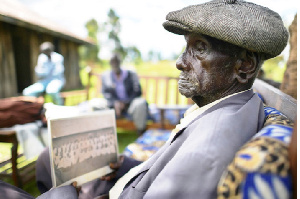The Kipsigis and Talai communities of Kericho county say the British brutally evicted them from their ancestral land between 1895 and 1963 to make way for lucrative tea plantations owned by white settlers.
Kenya’s Great Rift Valley town of Kericho is now famous for tea farms, most of them owned by various British and multinational tea corporations, including Findlay’s, Williamson Fine Tea and Unilever. While Kericho boasts some of Kenya’s most profitable agricultural land, the Kipsigis and Talai people say they are yet to benefit from it.
They say their forbears rather suffered serious human rights violations including torture, unlawful killings, sexual violence, arbitrary detention, arbitrary displacement and violations of the rights to privacy and property, adding that they are yet to receive any form of compensation or redress.
“The day of eviction, armed men working for the British administration came and pushed us out of our homes by force,” Kibore Cheruiyot Ngasura, who was forced out of his home in 1934 by the British and now in his late 90s recalled. “Women whose husbands were jailed were raped. They beat everybody. It was chaotic day.”
He said he and hundreds of families were deported by decree and made to walk to an area called Gwasi, where many suffered poor living conditions and died.
Today, many Kipsigis and Talai people live as squatters and are landless after their families were expelled from their lands in Kericho. Ngasura and over 100,000 people from Kipsigis and Talai communities have since been demanding compensation from the British government.
In September 2019, they asked the United Nations to investigate. “Our argument is they started a form of apartheid in Kericho. And our argument is the world needs to know these things,” Lawyer Joel Kemutai Bosek, one of the lawyers representing the two communities, said at the time.
“Our argument is much as we are concerned, very bitter, and very much strongly coming out as people who are oppressed, we are also saying we are reasonable enough. And they should be reasonable,” he added.
Kenya’s land commission in February 2019 ruled that the British unlawfully seized the land from the Kipsigis and Talai community and recommended the UK apologize. But that never materialized as tea companies continued to challenge the ruling in court.
Kericho County Governor Paul Chepkwony told VOA that year that they are using legal means to deal with the matter. “These people don’t want to chase away investors. This is something that I need to make very clear. But they know these investors are doing honest business but, in stolen land. And they want to discuss how they can be remedied so that they can live harmoniously with the investors,” he said.
In August this year, UN authorities said Britain should pay compensation to the two Kenyan communities who were forced off their land in “gross human rights violations”. Six UN special rapporteurs wrote to the government saying they were concerned that the UK had failed to provide reparations to the Kipsigis and Talai people.
The UN rapporteurs told the British Government that reparations should include “measures in the areas of restitution, compensation, rehabilitation and satisfaction as well as participation of the victims in the establishment and implementation of such measures”.
The UN said it had intervened because the British government has failed to enter into any kind of process to resolve the matter and apologize publicly to the victims. The UN further went on to remind the British government of the “obligation of States to adopt measures to ensure justice, truth, reparation and guarantees of non-recurrence of past human rights violations”.
It is not thought that the UK would face any sanctions if they did not respond to the rapporteurs’ comments, The Telegraph reported.
“The world needs to know that tea which is being exported from Kericho is blood tea,” Kericho County Governor Chepkwony told BBC recently. “We need to bring a closure by demanding reparations and an apology from the UK government.”
A spokesperson from the Foreign, Commonwealth and Development Office (FCDO) has said that the UK government has already recognized that some Kenyans suffered abuse at the hands of the colonial administration during the “emergency period” and the Mau Mau insurgency.
The spokesperson added that: “A UK Government statement made in 2013, recognising the victims of torture and ill-treatment during the emergency period, was part of the settlement by the UK Government of claims made by Kenyan citizens.
“We regret that these abuses took place, and that they marred Kenya’s progress towards independence.”
 Home Of Ghana News Ghana News, Entertainment And More
Home Of Ghana News Ghana News, Entertainment And More





